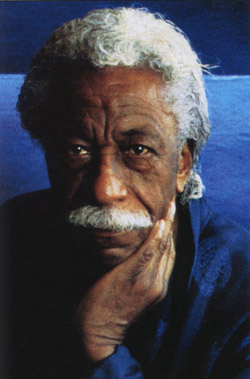 "Nothing came easy," Gordon Parks wrote in his autobiography. "I was just born with a need to explore every tool shop of my mind, and with long searching and hard work. I became devoted to my restlessness."
"Nothing came easy," Gordon Parks wrote in his autobiography. "I was just born with a need to explore every tool shop of my mind, and with long searching and hard work. I became devoted to my restlessness."
His restlessness led to more than 90 years of creative vigor. Honored by Wichita State in 1991 with the university’s highest award, the President’s Medal, Parks made his reputation as a Life magazine photographer, capturing powerful images, both grim and glamorous, from the middle decades of the 20th century.
He then turned to moviemaking with The Learning Tree, filmed in his hometown of Fort Scott, Kan., followed by Shaft, a thriller starring America’s first black action hero, Richard Roundtree as detective John Shaft.
A remarkably diverse artist, Parks also composed symphonies and sonatas and choreographed and scored Martin, a ballet in memory of the Rev. Martin Luther King Jr. And he authored some 20 books, beginning in 1963 with his autobiographical novel, The Learning Tree, about a boy of 15 experiencing love, loss and racism in small-town America, and continuing through to Half Past Autumn, a retrospective of his life and work, which was accompanied by The Corcoran Gallery’s traveling exhibition of the same name.
The images here are from that exhibition, which visited WSU’s Ulrich Museum of Art in 1999, when Parks was 86. “I think of my life in terms of seasons,” he then said over the phone from his home in New York City. The sound of his voice echoed the startling dichotomy of his photographic subjects — and of his life: It was at once softly elegant and as gritty as sandstone. Gordon Parks died March 7 in New York and was laid to rest in Fort Scott.





